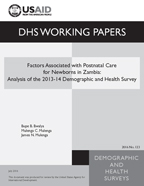
Abstract:
Postnatal care (PNC) is critical for the
survival of newborns. In Zambia, despite
emphasis on PNC by the government and
international organizations, PNC coverage
continues to be low. This study assessed the
demographic and socioeconomic factors
associated with newborns’ receipt of PNC and
the timing of first PNC in Zambia. Based on
data from the 2013-14 Zambia Demographic and
Health Survey (ZDHS), this study used
bivariate, binary, and multinomial logistic
regression analyses to examine PNC for births
at home and at health facilities. The results
indicate different factors associated with
PNC and timing at which newborns receive
their first PNC between births delivered at
home and at health facilities. For home
births, perceived child size at birth by
mothers, region of residence, access or
exposure to media, and mothers’ numbers of
ANC visits are the major determinants of PNC.
Regarding timing of first PNC within 2 days
of childbirth, among newborns delivered at
home the major determinants are perceived
child size at birth by mothers, region of
residence, mothers’ access to media, and
number of ANC visits. In contrast, among
newborns delivered in a facility, perceived
size at birth, region of residence, and
mothers’ employment status are the only
factors associated with receiving PNC within
the first 2 days. Therefore, recommendation
is made to encourage delivery in a health
facility, to emphasize the importance of ANC
visits, and to disseminate information
through various media and innovative programs
such as Information Education and
Communication (IEC).
 Factors Associated with Postnatal Care for Newborns in Zambia: Analysis of the 2013-14 Demographic and Health Survey (PDF, 558K)
Factors Associated with Postnatal Care for Newborns in Zambia: Analysis of the 2013-14 Demographic and Health Survey (PDF, 558K)
